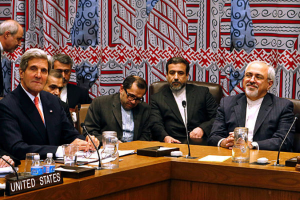
By: Sarah Smith
In opposition to the hushed tones discussing of Israel’s nuclear weapons program, or the uneasy dissertation of Pakistan’s shaky stability, the United States’ fear of a nuclear Iran remains paramount in our foreign policy concerns. The lone theocratic wolf of the Middle East, a nuclear Iran could succumb the region into the pitfalls of religious, ethnic, and political conflict; the dominoes would fall from Iran to Israel, from Pakistan to Saudi Arabia. It doesn’t take a PhD to realize the United States, China, and Russia all prioritize the elimination of this possibility. Most recently, the United States has achieved some success in mitigating the emergence of a nuclear Iran. The proposed U.S.-Iran deal freezes or reverses all of Iran’s nuclear progress by halting the installation of new centrifuges and the construction of a heavy water reactor, capping the amount and type of enriched uranium that Iran is allowed to produce, and creates unprecedented oversight of the nation’s nuclear facilities.
So why did it take Iran until 2013 to finally admit to its pursuit of a nuclear weapons and approach the West for negotiations? Popular explanation for this decision is the effect of U.S., E.U., and U.N. sanctions on Iran’s economy. While the United States has imposed restrictions on Iran’s activities since 1979, President Obama upped the ante by issuing sanctions targeting Iranian oil exports in 2011. In general terms, these sanctions criminalized any action, company, or government who dealt in Iranian oil exports, closing down the markets to the world’s third biggest oil exporter and halting the 2.2 million barrels-a-day flowing out of the country. This did not stop the flow of oil across Iran’s borders, but rather makes the process extremely difficult and expensive. One scholar has equated this type of foreign policy to a financial noose that will slowly tighten and gradually make life more difficult for Iranians.
These sanctions have indeed achieved success in crippling Iran’s economy; a 60 percent decrease in oil sales, 40 percent decrease in oil production, 5-8 percent drop in GDP, currency decline, inflation, are just a few of the economic downsides of Iran’s status as a rogue nation. With success, however, comes failure. Sanctions failed to do the one thing the leading powers wanted: halt Iran’s nuclear program. In reality, 2013 was the perfect formula for the West in Iran; a new, perhaps moderate, leader was elected, stricter sanctions were prescribed, and the proverbial noose of the West finally resulted in unsustainable hardship for Iran’s economy and population.
Notwithstanding, this set of events is not the magical foreign affairs concoction to remedying proliferators. Sanctions, in fact, only have a 17 percent success rate. The sanctions against Iran are just one example of success in the 115 cases of economic sanctions in U.S. foreign policy history. Yes, from an economic perspective, the restrictions and limitations of Iran’s economy have resulted in openness to negotiation, but what about other cases of rampant oligarchies running against the international law curve? Have sanctions caused external change or internal strife?
The dichotomy between North Korea and the South Sudan provides an example of internal strife occurring due to the crippling effect of sanctions. With both countries marred by the legacy of colonialism, the north-south divide in each has been a matter of great contention. In addition to this camaraderie, each nation has been subjected to unilateral U.S. sanctions. In North Korea, we have only recently learned of the harsh conditions facing average citizens. It is evident Kim Jong-Un’s shadow state is suffering, but he seems to be more preoccupied by subpar nuclear devices and playing basketball with Dennis Rodman.
South Sudan, on the other hand, is a nation struggling for survival. While still under various sanctions, the world’s newest nation has recently found itself in more turmoil. Unable to fully develop, the ethnic conflict zero-sum politics has caused an insurgence of violence. South Sudan is on the precipice of democratization, which is considered the most opportune time for a state to engage in conflict. Unlike North Korea, however, South Sudan does not necessarily view the West as a “Great Satan” infringing upon state sovereignty; they need Western help to survive.
Interestingly, the first recorded implementation of forceful economic sanctions resulted in failure. UN Resolution 232 was the first instance of the United Nations utilizing sanctions as a means to end the unwanted rule of the Rhodesian minority in 1966. Notoriously, Rhodesia was able to fully function outside of the crippling sanctions and international isolation; in fact, revolution did not occur until 1980, when the white-minority finally fell to Robert Mugabe’s black majority fighters. Mugabe’s everlasting position as head of state speaks to the minimal progress for democratization within Zimbabwe.
The objective of sanctions is to instigate a desired outcome reaction for the sender affected state. This outcome is typically regime change, but has recently been designated as a way to get a country to do what the West wants. As we have seen in Rhodesia, North Korea, and the South Sudan, this is not the recurring trajectory. Perhaps no other country represents the failure of sanctions better than Cuba, our foe to the south. Over 50 years in the making, the sanctions and embargoes have not thwarted Castro’s regime but have rather sunk Cuba’s status into the third world. Yes, there has been an estimated $1.1 trillion loss for Cuba in this time frame, and yes, the country remains on the hinges of international society. The political system, however, remains untouched.
So how did the carrots outweigh the sticks in Iran? In addition to Rouhani’s ambiguous desire for negotiation, it is Israel’s nuclear-missile-capable missile-defense-shield to the west that provides the most incentive for a divergence from status quo. Just like Iraq in 1981, Israel would undoubtedly eliminate any instance of Iran’s nuclear weapons program before completion of a successful test. This is an act of aggression no one in the international community wants, especially the United States, whose blind eye to Israel’s nuclear program continues to undermine any credibility to nonproliferation efforts. Sanctions, therefore, are arguably not the cure-all, blanket solution to our international affairs spats. Sanctions harm the population of a country more than they poison the leaders; the Castros, Husseins, and Kims remain in power while the population slowly withers.
The Germans and the Swiss have, proposed a new protocol. “Smart sanctions” are aimed at discomfiting the leaders of the target country rather than its economy as a whole. These types of measures include imposing restrictions on travel by government officials and excluding them from sporting and cultural events, as well as freezing their overseas bank accounts. In other words, they make the leaders suffer instead of millions of innocents.
While this is perhaps the future of sanctions, the Iranian scenario is by no means considered a success. The recent agreement reached between the U.S. and Iran is a preliminary agreement, wherein Iran agreed to minor limitations on its nuclear weapons development. Thus far, no destruction, additional IAEA (International Atomic Energy Agency) safeguards, and no true end to weapons development has been solidified. President Rouhani, in fact, was flustered by Secretary Kerry’s comments about prohibiting Iran’s right to highly enrich uranium, and openly responded, “Enrichment [of uranium], which is one part of our nuclear right, will continue, it is continuing today and it will continue tomorrow and our enrichment will never stop and this is our red line.”
Before we begin celebrating the success of sanctions on Iran, let’s remember this agreement is provisional and only warranted for six months. Iran has made such promises three times before, and could easily back out of these preliminary measures with no true harm done to its program, and no real retaliatory threat from the United States. After all, this would not be the first instance of a Middle East deal crumbling in the hands of American foreign policy officials.

